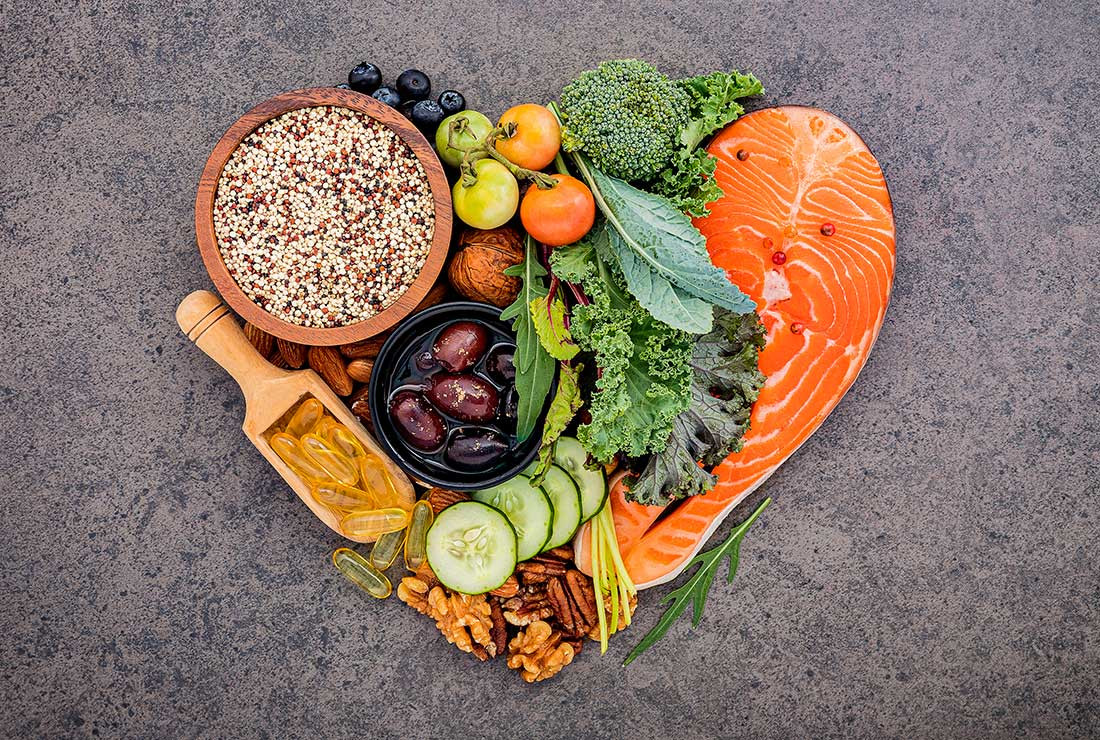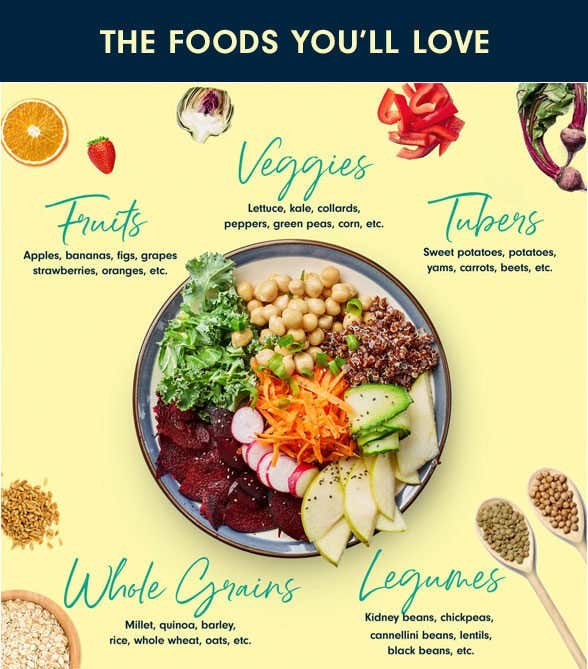How to Make Gluten Free BBQ Sauce from Scratch: A Step-by-Step Tutorial
Everything About Healthy Food: Benefits of Enjoying Plant Based Alternatives
The discussion surrounding plant-based diet regimens has actually gotten considerable focus in recent years. Many individuals are exploring the potential health benefits, dietary advantages, and environmental effects connected with these dietary choices. As individuals become much more knowledgeable about their food's influence on health and sustainability, questions arise regarding the functionalities of embracing such a way of life. What particular modifications can one anticipate, and how might these selections improve not only personal health and wellness however also the world's future?
Recognizing Plant-Based Diet Regimens
Several people associate plant-based diet regimens mainly with vegetarianism or veganism, these diets can encompass a broad variety of eating patterns that prioritize whole, minimally refined plant foods. Such diets commonly include fruits, vegetables, whole grains, vegetables, seeds, and nuts, while limiting or removing animal items. This versatility enables individuals to tailor their nutritional choices according to personal preferences and dietary needs. Some may take on a mostly plant-based diet plan while still sometimes consuming meat or dairy products, often referred to as a flexitarian method. The emphasis remains on incorporating more plant foods, which can lead to a diverse variety of flavors and meals. Comprehending these various interpretations of plant-based consuming is crucial for appreciating its accessibility and charm in contemporary food culture.
Health And Wellness Perks of Plant-Based Foods
The health and wellness benefits of plant-based foods are significant, using a nutrient thickness benefit that sustains overall well-being. Research study shows that these foods can improve heart health and play a vital duty in efficient weight administration. By incorporating extra plant-based options, people may enhance their nutritional selections and advertise long-lasting wellness.
Nutrient Density Benefit
Nutrient thickness plays an essential duty in the wellness benefits of plant-based foods, making them a compelling choice for those seeking a well balanced diet plan. Plant-based foods, such as fruits, veggies, legumes, nuts, and entire grains, are often abundant in necessary vitamins, minerals, and anti-oxidants while being reduced in calories. This high nutrient thickness enables individuals to take in fewer calories while still fulfilling their dietary requirements. Additionally, these foods are loaded with dietary fiber, advertising gastrointestinal wellness and aiding in weight administration. By including nutrient-dense plant-based options, consumers can enhance their total health and wellness, sustain their body immune systems, and reduce the threat of persistent conditions. Inevitably, the nutrient density of plant-based foods highlights their importance in a health-conscious way of living.
Heart Health And Wellness Enhancement

Weight Monitoring Support
Along with advertising heart health and wellness, a plant-based diet plan can considerably aid in weight management. This dietary strategy stresses entire foods such as fruits, veggies, vegetables, nuts, and entire grains, which are generally lower in calories and greater in fiber compared to animal-based products. The high fiber material aids increase satiety, reducing general calorie consumption. Additionally, plant-based diet plans are commonly rich in vital nutrients while low in undesirable fats, making it easier to keep a healthy and balanced weight. Sugar Free Sauces. Study indicates that individuals who adopt a plant-based way of living have a tendency to have reduced body mass indexes (BMIs) and experience more successful weight loss contrasted to those who take in meat-heavy diet plans. As a result, welcoming plant-based choices is a calculated choice for efficient weight management
Nutritional Worth of Plant-Based Active Ingredients
Plant-based components are rich in vital nutrients, providing a varied selection of vitamins, minerals, and antioxidants that add to total health and wellness. A comparison of healthy protein sources exposes that while pet products are frequently considered as remarkable, numerous plant-based alternatives provide ample healthy protein and various other advantageous substances. Recognizing the dietary value of these active ingredients can help individuals make informed nutritional selections.
Essential Nutrients in Plants
Nutrient-rich active ingredients discovered in plants supply a varied array of essential vitamins and minerals that contribute considerably to overall wellness. These active ingredients are abundant in vitamins A, C, and K, which support immune feature, vision, and blood clotting, respectively. Furthermore, plants supply essential minerals such as magnesium, calcium, and potassium, critical for heart health and wellness, muscle mass feature, and bone toughness. The visibility of fiber in plant-based foods help food digestion and advertises a healthy gut microbiome. Antioxidants, discovered perfectly in fruits and vegetables, help fight oxidative anxiety and decrease inflammation. Numerous plant foods are reduced in calories yet high in nutrients, making them an outstanding selection for those looking for to keep a healthy and balanced weight while ensuring perfect nutrient consumption.

Comparing Protein Resources
Healthy protein resources differ substantially in their nutritional accounts, with plant-based ingredients offering unique benefits. Unlike animal healthy proteins, which usually include saturated fats and cholesterol, plant healthy proteins tend to be lower in these harmful elements. Legumes, nuts, seeds, and whole grains are abundant in vital amino acids, fiber, vitamins, and minerals. As an example, lentils give high healthy protein web content together with significant iron and folate, while quinoa is a complete protein, using all 9 crucial amino acids. In addition, plant-based proteins are typically come with by anti-oxidants and phytochemicals that support general health. The change description to plant-based healthy protein sources not just boosts nutritional consumption however additionally aligns with sustainable nutritional practices, minimizing ecological effect and promoting long-term health benefits.
Environmental Influence of Plant-Based Consuming
As understanding of environment adjustment grows, lots of individuals are exploring sustainable nutritional choices that can greatly lessen their environmental footprint. Plant-based consuming has actually become a significant factor to minimizing greenhouse gas emissions, which are mostly related to animals production. The cultivation of fruits, legumes, vegetables, and grains generally needs less resources, such as water and land, compared to pet farming. Furthermore, plant-based diet regimens can lead to reduced deforestation, as much less land is required for grazing livestock or growing animal feed. By changing in the direction of plant-based alternatives, customers can support biodiversity and promote much healthier ecological communities. Overall, embracing plant-based eating not only advantages personal health however likewise represents an important step toward environmental sustainability and preservation initiatives.
Conquering Common Misconceptions
While lots of people recognize the advantages of a plant-based diet, several misunderstandings frequently prevent them from fully welcoming this way of life. An usual belief is that plant-based diets do not have enough protein; nonetheless, numerous plant resources, such as beans, nuts, and tofu, supply adequate protein. In addition, some presume that this diet regimen is pricey, when in truth, staples like beans, rice, and seasonal vegetables can be fairly cost effective. Another misunderstanding is that plant-based eating is excessively restrictive, whereas it really provides a varied range of foods and tastes. Finally, numerous fret that a plant-based diet might cause shortages, yet with appropriate preparation, individuals can get all required nutrients, including nutrients, while appreciating a broad variety of tasty meals.
Tips for Transitioning to a Plant-Based Lifestyle
Making the shift to a plant-based way of living can be an improving experience, though it commonly needs some support to navigate the preliminary changes. First, people are encouraged to begin slowly, integrating even more fruits, veggies, legumes, and entire grains right into their meals while minimizing meat and dairy consumption. Dish preparation is necessary; preparing a regular food selection can help reduce the modification and protect against last-minute unhealthy options. Exploring cooking techniques and brand-new recipes can likewise boost the experience and preserve exhilaration regarding plant-based eating. In addition, signing up with support teams or neighborhoods can offer inspiration and share useful ideas. Staying educated concerning nourishment warranties balanced meals, preventing deficiencies while promoting a healthy, gratifying plant-based way of life.

Delicious Plant-Based Dish Concepts
Checking out delicious plant-based dish ideas can motivate individuals to embrace an extra healthy diet. One popular alternative is a hearty quinoa salad, featuring cherry tomatoes, cucumber, and a zesty lemon-tahini dressing. An additional favorite is a tasty lentil stew, packed with carrots, celery, and great smelling natural herbs, best for a comforting dinner. For breakfast, overnight oats made with almond milk, chia seeds, and topped with fresh berries give a nourishing beginning to the day. Furthermore, a dynamic veggie stir-fry with tofu and a variety of vibrant veggies can be a quick he has a good point yet satisfying dish. Luscious avocado salute on whole-grain bread, sprayed with seeds and spices, supplies an easy yet tasty treat. These dishes display the Visit Website range and richness of plant-based consuming.

Frequently Asked Concerns
Can a Plant-Based Diet Regimen Provide Sufficient Protein?
The inquiry of whether a plant-based diet can give sufficient protein prevails. Numerous sources, consisting of legumes, nuts, seeds, and whole grains, can fulfill healthy protein needs properly, sustaining a nourishing and well balanced diet regimen for individuals.
Are Plant-Based Diets Ideal for Kid?
The viability of plant-based diet regimens for children depends on mindful planning. Adequate nutrients need to be guaranteed, including minerals, vitamins, and healthy proteins. With correct advice, such diet regimens can sustain healthy growth and advancement in youngsters.
Exactly how Do I Eat Out on a Plant-Based Diet plan?
Eating in restaurants on a plant-based diet entails looking for dining establishments with diverse menus, requesting modifications, and discovering vegan-friendly alternatives. Planning ahead and interacting nutritional choices can enhance the eating experience while keeping nutritional choices.
What Prevail Allergens in Plant-Based Foods?
Common irritants in plant-based foods consist of soy, gluten, nuts, and seeds - Plant Based Chicken. Individuals following a plant-based diet plan needs to recognize these allergens and check out tags carefully to avoid unfavorable reactions and assure risk-free intake
Can Plant-Based Diets Aid With Fat Burning?
Research study shows that embracing a plant-based diet might promote weight-loss because of its generally reduced calorie density and greater fiber content. This combination can improve satiety, helping people handle their calorie consumption effectively. Numerous people link plant-based diet regimens primarily with vegetarianism or veganism, these diet plans can encompass a large range of eating patterns that focus on whole, minimally processed plant foods. Nutrient density plays a crucial function in the health and wellness advantages of plant-based foods, making them a compelling choice for those seeking a well balanced diet. Plant-based diet plans have actually been revealed to considerably improve heart wellness, as they usually contain components that support cardiovascular feature. In enhancement to promoting heart health and wellness, a plant-based diet can considerably aid in weight administration. A common belief is that plant-based diets lack sufficient protein; nevertheless, various plant resources, such as legumes, nuts, and tofu, give ample healthy protein.